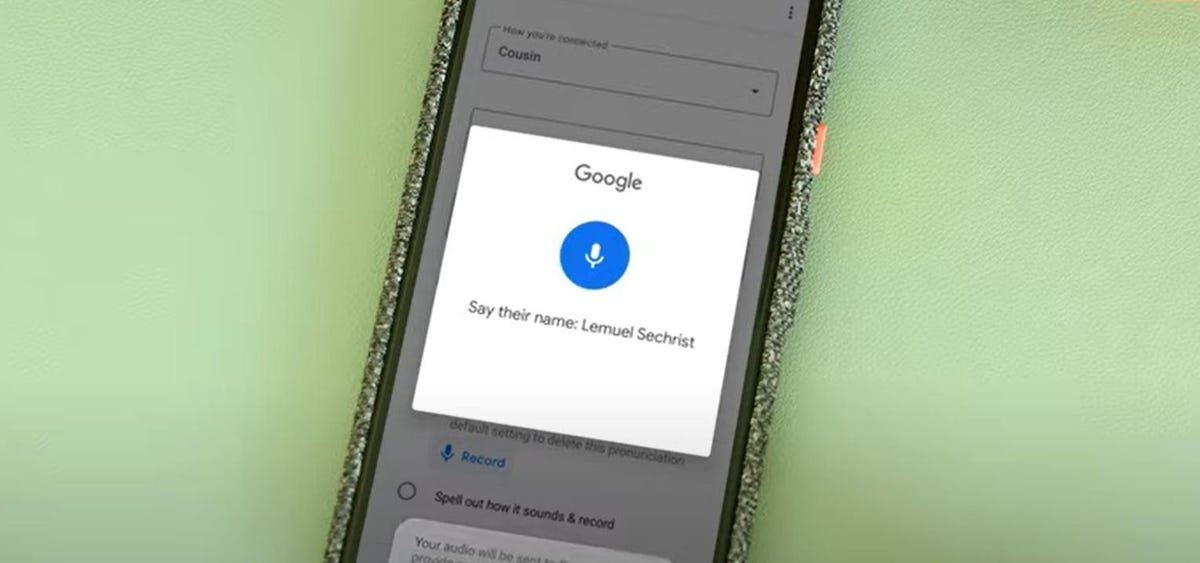
Google Assistant can now be taught how to pronounce and recognise names | ZDNet

Image: Google/Screenshot
Google announced it has made a number of upgrades to Google Assistant so that the artificial intelligence-powered virtual assistant no longer mispronounces people’s names, especially those that are less common, and can better understand the context of conversations.
Users can now teach Google Assistant to enunciate and recognise the names of their contacts, by listening to a user pronounce them. Google assured its Assistant would not keep a recording of user voices.
The feature is initially available in English, but Google says it plans to expand it in other languages “soon”.
Google added it rebuilt Assistant’s natural language learning models and improved its reference resolution using its BERT machine learning model, so it can process words in relation to one another in a sentence, instead of one-by-one in order.
The company noted in a blog post that making those changes means Assistant can understand context and respond “nearly 100% accurately”. The first features the improvement will apply to are alarm and timer tasks on Google smart speakers in English in the US, with plans to bring the capability to other uses cases and expand it to phones and smart displays.
“Assistant’s timers are a popular tool … you might fumble and stop mid-sentence to correct how long the timer should be set for, or maybe you don’t use the exact same phrase to cancel it as you did to create it. Like in any conversation, context matters and Assistant needs to be flexible enough to understand what you’re referring to when you ask for help,” Google said.
The tech giant has also used AI as part of study to see if technology could be used to help non-specialist clinicians, such as nurses, improve the accuracy of diagnosis and treatment of skin conditions.
As part of the study, which was published in JAMA Network Open, 40 non-specialist clinicians interpreted over 1,000 de-identified images of patients’ skin conditions from a telemedicine dermatology service, identified the condition, and made recommendations. For half of the cases, the clinicians had access to the AI tool, while the other half didn’t.
The results showed that using the AI tool, clinicians improved their ability to interpret skin conditions and arrived at the same conclusion as the diagnosis of dermatologists.
“The chances of identifying the correct top condition improved by more than 20% on a relative basis, though the degree of improvement varied by the individual,” Google said about the study.
Elsewhere within Google, the company’s Android earthquake detection system that was announced in August is now available in New Zealand and Greece. At the time of launch, Google only made the earthquake alert available to Android users in California but said there were plans to roll it out to other parts of the US and other countries.
The system relies on the accelerometers that are built into smartphones to detect signals for earthquakes.
If the phone detects an earthquake, it will send a signal to Google’s earthquake detection server, along with a course location of where the tremor occurred. The server will then combine the information it has received from multiple Android phones to figure out if an earthquake is happening.
Eventually, if an earthquake is detected, the system will automatically send warning alerts to Android devices so people can find cover or safer ground.
The company has also made updates to Search, pre-empting that the frequency of international travel will increase. It has introduced a feature to notify users when they search for travel information such as flights, hotels, or things to do, they are also provided access to COVID-19 related travel advisories or restrictions.
Information could include whether travellers will need to quarantine on arrival or provide proof of immunisation records or test results, as well as when restrictions are added, lifted, or reduced, Google said.
The updates are country-specific, while state-specific information is available in the US.
Other travel-related updates that Google has made include enabling Maps to make pit stop suggestions for road trips and allow people to use Explore to browse destinations based on interest filters such as outdoors, beaches, or skiing.
Related Coverage
Stay connected with us on social media platform for instant update click here to join our Twitter, & Facebook
We are now on Telegram. Click here to join our channel (@TechiUpdate) and stay updated with the latest Technology headlines.
For all the latest Technology News Click Here
For the latest news and updates, follow us on Google News.

